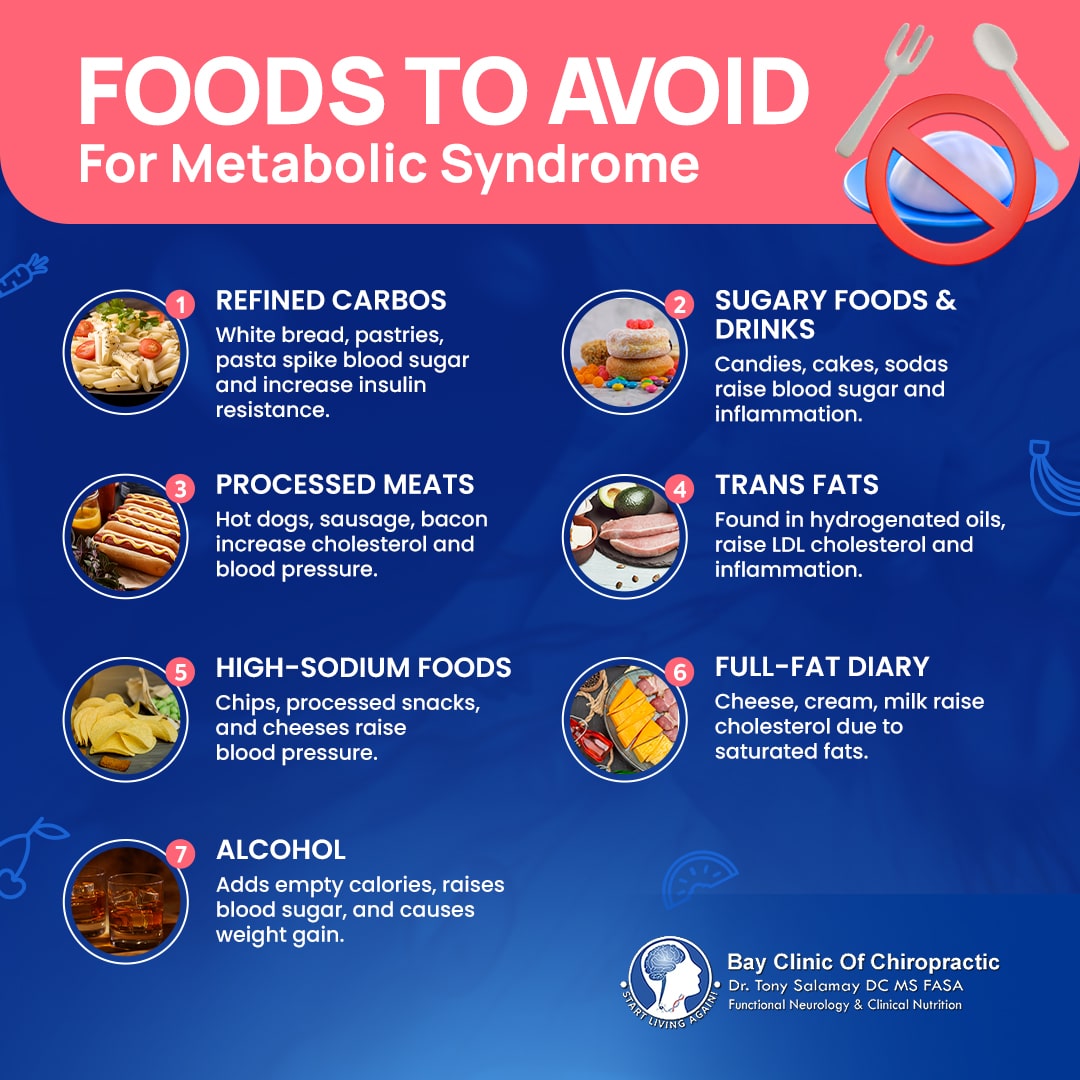Have you been feeling overwhelmed, trying to manage high blood pressure, stubborn belly fat, or fluctuating blood sugar? You’re not alone! Understanding metabolic syndrome might bring some clarity- and even hope!
Metabolic syndrome isn’t a single condition you can take a pill for, it’s a cluster of metabolic risk factors such as elevated blood sugar, abnormal cholesterol, and high blood pressure that increase the risk of type 2 diabetes, heart disease, and other chronic illnesses.
Maybe you’ve noticed these health issues creeping up over time, and despite your best efforts in trying to manage your health, it feels like an uphill battle.
We are here to remind you that there is hope- with proper guidance and lifestyle changes you can manage and even reverse metabolic syndrome naturally! Natural treatments for metabolic syndrome are increasingly getting the recognition they deserve.
In a study on natural treatments for metabolic syndrome, Dr. Angelo Maria Patti from the University of Palermo, Italy states “An adequate intake of foods containing antioxidant compounds with an anti-inflammatory effect reduces the incidence of MetS and the factors that determine this pathological condition.”
At the Bay Clinic of Chiropractic, we support you on this path with a compassionate and integrative approach. So let’s dive in and discover what metabolic syndrome is, why it happens, and how to tackle it naturally and make lasting changes!
What is Metabolic Syndrome?
Metabolic syndrome, formerly known as metabolic syndrome X is a metabolic disorder characterized by a cluster of conditions that occur together, significantly increasing the risk of stroke, heart disease, and type 2 diabetes.
The key characteristics include high blood pressure, elevated blood sugar levels, abnormal cholesterol and triglyceride levels, and excess fat around the waist and abdomen. Individually, these factors raise the risk of chronic diseases such as type 2 diabetes, stroke, and cardiovascular disease but when they occur together, the risk multiplies.
Apple VS Pear Body Shape

Apple-shaped body or abdominal fat around the waist is characteristic of people with metabolic syndrome and is related to an increased risk of chronic illness.
In a study on the relationship between obesity and metabolic syndrome, Dr. Harold E Lebovitz from the State University of New York Health Science, Brooklyn, New York, USA, states “Obese patients with the metabolic syndrome generally have a visceral (apple-shaped) fat distribution and are at an increased risk of macrovascular disease, while those with peripheral (pear-shaped) obesity tend not to have metabolic abnormalities and are at less risk.”
People with a pear body shape or fat around their hips are at less risk of developing the chronic conditions associated with metabolic syndrome.
What Are The Symptoms of Metabolic Syndrome?
The symptoms of metabolic syndrome might not be noticeable initially as the involved conditions such as high blood pressure, high blood sugar, and high triglycerides, develop gradually over time. However, once they do you may experience symptoms characteristic of those conditions. Here are the most common symptoms:
- High Blood Pressure: May cause headaches, dizziness, nosebleeds, and shortness of breath.
- High Blood Sugar: Symptoms include increased thirst, fatigue, and frequent urination.
- High Triglycerides and Low HDL Cholesterol: They often don’t show symptoms but are detected through blood tests.
- Increased Waist Circumference: This is the most visible sign of metabolic syndrome. Excess abdominal fat around the waist is an indicator of risk.

What Causes Metabolic Syndrome?
The causes of metabolic syndrome are often linked to insulin resistance, where the body’s cells and chronic inflammation do not effectively respond to insulin. Metabolic syndrome is mainly influenced by lifestyle and genetic factors. Here are the key contributing factors for metabolic syndrome:
- Sedentary Lifestyle: Physical inactivity contributes to weight gain and poor insulin sensitivity.
- Unhealthy Diet: Diets high in processed foods, added sugars and unhealthy fats lead to weight gain, insulin resistance, and inflammation.
- Obesity: Excess body fat, especially around the waist, is strongly linked to metabolic syndrome. In a study of obesity and metabolic syndrome, Dr. Yuji Matsuzawa from the Sumitomo Hospital, Osaka, Japan states “Visceral fat accumulation plays an essential role in the development of multiple risk factors.”
- Genetic Predisposition: Family history can increase the risk of some of the contributing conditions such as type 2 diabetes and hypertension.
How is Metabolic Syndrome Diagnosed?
A diagnosis of metabolic syndrome requires the presence of at least three of five criteria:
- High Waist Circumference: Generally over 40 inches (102 cm) in men and 35 inches (89 cm) in women, though standards may vary by ethnicity.
- High Blood Pressure: Blood pressure readings of 130/85 mmHg or higher, or using blood pressure medications.
- Elevated Fasting Blood Sugar: Fasting blood sugar levels of 100 mg/dL (5.6 mmol/L) or higher, or being on medication for blood sugar control.
- High Triglycerides: Fasting triglycerides levels of 150 mg/dL (8.3 mmol/L) or higher
- Low HDL cholesterol: Levels below 40 mg/dL (2.2 mmol/L) in men or below 50 mg/dL (2.7 mmol/L)in women.
Metabolic Syndrome Risk Factors

Metabolic syndrome risk factors increase the likelihood of developing metabolic syndrome. Here are the primary risk factors associated with metabolic syndrome:
- Age: The risk for metabolic syndrome increases with age, particularly after 45. As people age, metabolism slows down, insulin sensitivity decreases, and the likelihood of chronic health conditions rises. In a study on aging and chronic illnesses, Dr. Xiaodong Sun from the Weifang Medical University, Weifang, China states “Metabolic diseases pose a significant burden on older individuals and increase the risk of cardiovascular disease.”
- Obesity: Excess body fat around the waist, is a major contributor to metabolic syndrome. Abdominal (visceral) fat is closely linked to insulin resistance, inflammation, and metabolic imbalance, all of which contribute to this condition.
- Ethnicity: Certain ethnic groups, including Hispanic, African-American, South Asian, and Native American populations, are at a higher risk for metabolic syndrome.
- Insulin Resistance: A key contributor to metabolic syndrome. It occurs when the body’s cells don’t respond effectively to insulin, leading to high blood sugar levels. Insulin resistance often leads to weight gain, high blood sugar, and an imbalance in cholesterol levels.
- Family History: A family history of diabetes, hypertension, or heart disease, raises the risk of metabolic syndrome. Genetic factors can predispose individuals to insulin resistance and associated metabolic conditions.
- Other Health Conditions: Several health issues increase the likelihood of developing metabolic syndrome including polycystic ovary syndrome (PCOS), sleep apnea, and non-alcoholic fatty liver disease (NAFLD).
Awareness of these risk factors can help individuals take preventative steps to lower their risk, including adopting healthier lifestyle habits and seeking guidance from a healthcare practitioner.
Natural Treatment Options for Metabolic Syndrome
Natural treatment options such as dietary changes, herbal remedies, and exercise provide a holistic approach focused on addressing the underlying causes rather than just managing symptoms.
Lifestyle changes, such as dietary adjustments, stress management, and certain supplements and herbs can be highly effective in reducing the risk factors associated with metabolic syndrome, especially if you choose a dedicated healthcare professional to guide you through the process.
At the Bay Clinic of Chiropractic in Panama City, Florida, we have an amazing team dedicated to helping people just like you! Dr. Tony Salamay is an expert in the field and has years of experience with patients with metabolic syndrome, as well as the conditions associated with it!
In the section below, you will learn about the natural ways we treat metabolic disorders at the Bay Clinic of Chiropractic!
Functional Medicine
Functional medicine offers a personalized, integrative approach to managing metabolic syndrome by addressing its root causes. Instead of focusing solely on treating symptoms, functional medicine seeks to understand the lifestyle, genetic, and environmental factors that contribute to metabolic diseases.
Dr. Tony Salamay is an expert in Functional Medicine and is dedicated to uncovering the root cause of your issue by taking the time to listen to you and assess your issues. You receive a tailored plan that includes healthy diet changes, exercise, stress reduction techniques, and support for hormonal balance and immunity.
By incorporating these changes and natural treatments you can improve insulin sensitivity, manage blood sugar, and support weight loss– key areas for managing metabolic syndrome effectively.
Functional Tests for Metabolic Syndrome
Functional testing provides an in-depth view of the body’s metabolic function, helping identify the specific imbalances that contribute to metabolic syndrome. A functional medicine practitioner will do basic blood testing such as a comprehensive metabolic panel (CMP), insulin, hemoglobin A1c (HbA1c), and a lipid panel (triglycerides and cholesterol levels).
These tests are done to assess the high blood glucose, insulin resistance, and abnormal levels of triglycerides and cholesterol which are characteristic of metabolic syndrome. Additionally, your functional medicine practitioner may do additional testing such as:
- Micronutrient Panel: Values levels of essential vitamins, minerals, and antioxidants to detect any deficiencies affecting metabolic functions.
- Genetic Tests: Assesses genetic predispositions that may influence metabolic syndrome risk, such as insulin resistance or cholesterol metabolism.
- DUTCH Test: Measures hormone levels and metabolites, particularly cortisol. It’s used to evaluate hormonal balance and stress impact on the body.
- Microbiome Test: Analysis of gut bacteria composition, identifying imbalances that may affect digestion, inflammation, and insulin sensitivity.
- Inflammation Test: Test for markers like C-reactive protein (CRP) to measure inflammation levels that contribute to metabolic and cardiovascular health risks.
Other testing may be needed depending on your unique case.
Dietary Changes
Diet plays a crucial role in managing metabolic syndrome as it directly impacts blood sugar, blood pressure, cholesterol levels, and body weight- key components of this condition.
A balanced diet can help regulate blood sugar, reduce inflammation, and improve heart health, especially for those with metabolic syndrome.
Dr. Tony Salamay from the Bay Clinic of Chiropractic has a masters in Human Nutrition and years of experience in the field. Dr. Salamay is a nutritionist in Panama City, FL and addresses your unique situation and creates a personalized plan to get you on track with your health journey.
In the section below we will list what foods to eat and what foods to avoid if you are at risk of metabolic syndrome.

Foods to Eat for Metabolic Syndrome
- Lean Protein: Chicken, turkey, fish, and tofu help maintain muscle mass and support blood sugar regulation without adding excess fat.
- Fatty Fish: Salmon, sardines, and mackerel contain omega-3 fatty acids which reduce inflammation and improve cholesterol levels.
- Leafy Greens: Spinach, kale, and collard greens are rich in antioxidants, vitamins, and magnesium which help improve insulin sensitivity.
- Non-Starchy Vegetables: Broccoli, bell peppers, and cauliflower are low in calories but high in fiber, vitamins, and minerals which support weight loss and metabolic health.
- Berries: Strawberries, blueberries, and raspberries are high in antioxidants, and fiber, and are low in carbs, helping control blood sugar and inflammation.
- Nuts and Seeds: Almonds, chia seeds, and flax seeds provide healthy fats, fiber, and protein.
- Legumes: Lentils, chickpeas, and black beans are high in fiber and protein, helping to control blood sugar and support weight management.
Foods to Avoid for Metabolic Syndrome
- Refined Carbohydrates: White bread, pastries, and pasta cause rapid blood sugar spikes and increase the risk of insulin resistance.
- Sweets and Sugary Beverages: Candies, cakes, cookies, sodas, and other foods and beverages high in added sugars are not recommended for metabolic syndrome.
- Processed Meats: Hot dogs, sausage, and bacon are high in unhealthy fats, sodium, and additives which increase cholesterol and blood pressure.
- Trans Fats: Found in partially hydrogenated oils. They raise LDL (bad) cholesterol and increase inflammation.
- High-Sodium Foods: Chips, processed snacks, and some cheeses contain high sodium which can cause high blood pressure.
- Full-Fat Diary: Full-fat cheese, cream, and milk are high in saturated fats which can raise cholesterol.
- Alcohol: Contains empty calories, can increase blood sugar, and lead to weight gain.

Supplements
Supplements can support the body’s metabolic processes, help manage blood sugar, improve cholesterol levels, and reduce inflammation. In the section below are our recommendations for supplements for metabolic syndrome:
Omega-3 Fatty Acids
Omega-3 fatty acids are essential fats known for their anti-inflammatory properties and benefits on cardiovascular health. They play a crucial role in managing several aspects of metabolic syndrome by helping to reduce blood triglyceride levels, support heart health, and improve insulin sensitivity.
You can find omega-3 fatty acids in fatty fish such as salmon, mackerel, and sardines, plant-based sources are flaxseeds, chia seeds, and walnuts. The daily recommended dose is 200 to 4000 milligrams but higher doses may be needed for metabolic syndrome. If you have further questions or concerns regarding intake, it’s best to consult with a healthcare provider to assure you are doing it optimally and safely.
Berberine
Berberine is a compound in several plants like goldenseal, barberry, and Oregon grape. Traditional Chinese Medicine (TCM) practitioners have used berberine for centuries for its blood-lowering properties, making it a great choice for people who have or are at risk for metabolic syndrome.
Berberine activates AMPK (adenosine monophosphate-activated protein kinase), an enzyme that helps regulate metabolism. Activating this enzyme improves insulin sensitivity, lowers blood sugar, and reduces total and LDL (bad) cholesterol.
Studies show that the effects of berberine on blood sugar control are similar to metformin, a common diabetes medication.
While you can find it in some plants, for the full potential of berberine, it’s usually taken as a supplement. The daily dose of berberine is 900 to 2000 mg, usually divided into 3 doses.
Chromium
Chromium is an essential trace mineral that plays a key role in metabolism. It helps enhance the action of insulin, the hormone responsible for transporting glucose (sugar) from the blood into cells. Improved insulin function can help people with insulin resistance.
Chromium can be found in foods like green beans, nuts, broccoli, whole grains, and potatoes. It is also available as a supplement, often in the form of chromium picolinate. The recommended dose ranges from 50 to 200 micrograms.
Potassium
Potassium is a mineral and electrolyte that helps regulate blood pressure, fluid balance, and muscle contraction. Potassium can help lower blood pressure by counteracting the effects of sodium in the body which is crucial for people with metabolic syndrome who are at risk for hypertension.
Foods rich in potassium are bananas, oranges, tomatoes, potatoes, spinach, and avocados. While a balanced diet can often provide a sufficient dose of potassium, supplements are available for those who may not get enough through food. The dose of potassium ranges between 2000 to 3000 mg per day for adults.
Vitamin D
Vitamin D is a fat-soluble vitamin, essential for bone health, immune function, and metabolic health. People with metabolic syndrome commonly have low vitamin D levels. Vitamin D plays a role in insulin sensitivity and blood sugar regulation, making it crucial for metabolic health. Low levels of vitamin D are linked to increased insulin resistance and a higher risk of developing type 2 diabetes, both of which are associated with metabolic syndrome.
The primary natural source of vitamin D is sunlight, as the body synthesizes it when the skin is exposed to UV rays. However, dietary sources include fatty fish, dairy products, egg yolks, and mushrooms. People who don’t get enough sun exposure or dietary vitamin D may benefit from supplements.
For adults, the recommended daily dose of vitamin D is 600 to 800 IU (international units) however some people may need higher doses. Consult with a healthcare practitioner or functional medicine provider to get the right dose for you.
Herbal Remedies
Traditional Chinese Medicine (TCM) practitioners have used herbal remedies for centuries to support metabolic health. Nowadays, more research supports natural remedies for many conditions, including metabolic syndrome. Here is an overview of our recommendations for herbal remedies:
Cinnamon
Cinnamon is a popular spice with antioxidant and anti-inflammatory properties. It contains bioactive compounds, such as cinnamaldehyde which increase insulin sensitivity and slow the breakdown of carbohydrates, leading to more stable blocked sugar levels after meals. By improving the body’s response to insulin, cinnamon can help reduce the risk of insulin resistance, a major factor in metabolic syndrome.
You can use ½ to 1 Teaspoon of ground cinnamon in oatmeal, yogurt, or tea. Cinnamon is also available in capsule form with a typical dose of 500 to 2000 mg daily. Make sure you are using Ceylon cinnamon rather than Cassia cinnamon if you are supplimating. Cassia cinnamon has higher levels of coumarin which is harmful to the liver.
Garlic
Garlic is well known for its heart health benefits, as it can help lower blood pressure, reduce cholesterol levels, and improve blood circulation. It contains allicin and sulfur compounds that help relax blood vessels, improve blood flow, and reduce blood pressure. It also has anti-inflammatory effects which help protect blood vessels from damage by high blood sugar and cholesterol.
You can use fresh garlic but it is also available as an extract.
Turmeric
Turmeric, particularly its active compound curcumin, is a powerful anti-inflammatory antioxidant. Studies show that curcumin can help lower blood sugar, improve insulin sensitivity, and reduce oxidative stress which is beneficial in managing metabolic syndrome. Additionally, turmeric supports heart health by improving cholesterol levels and introducing plaque buildup in arteries.
You can use turmeric for smoothies, cooking curries, or teas. Curcumin supplements are also available.
Holy Basil
Holy basil also known as tulsi, is an herb that helps the body manage stress, a significant factor in metabolic syndrome. It helps modulate stress hormones, such as cortisol, reducing the impact of stress on metabolic health. Its anti-inflammatory and blood sugar-lowering properties further help in reducing insulin resistance.
You can use dried holy basil leaves to make tea to experience the calming effect of this herb, and it is also available in capsule or tincture form.
Stress Management
Stress is a significant contributor to metabolic syndrome, as it triggers the release of cortisol, a stress hormone that raises blood sugar and blood pressure. Chronic stress can lead to increased abdominal fat, insulin resistance, and increase the risk of high blood pressure.
Here are 2 ways you can destress:
Mindfulness and Meditation
Mindfulness and meditation can help reduce stress and anxiety, improve mood, and lower cortisol levels. Just 10 to 15 minutes daily can significantly improve stress levels.
Breathing Exercises
Deep breathing exercises, such as diaphragmatic breeding, activate the body’s relaxation response. This practice lowers heart rate, reduces blood pressure, and decreases cortisol levels.
Exercise
Exercise is one of the most effective ways to improve metabolic health, as it enhances insulin sensitivity, reduces blood pressure, and supports weight loss. Physical activity also helps lower LDL (bad) cholesterol and increase HDL (good) cholesterol, directly addressing the causes of metabolic syndrome.
Sleep Schedule
Poor sleep is associated with increased insulin resistance, higher blood pressure, and weight gain which are risk factors for metabolic syndrome. Going to bed and waking up at the same time each day helps regulate your body’s circadian rhythm, improving sleep quality and duration.
According to a study on sleep time durations for the National Sleep Foundation by Dr. Max Hirshkowitz from the School of Medicine, Stanford University, Stanford, CA, USA, for healthy individuals with normal sleep, the recommended sleep patterns vary by age.
The recommended sleep duration for newborns is between 14 and 17 hours, while infants should get between 12 and 15 hours. Toddlers should get between 11 and 14 hours of sleep, preschoolers between 10 and 13 hours, and school-aged children between 9 and 11 hours.
For teenagers, the recommendation was 8 to 10 hours of sleep, 7 to 9 hours for young adults and adults, and 7 to 8 hours for older adults.
Frequently Asked Questions
What is Metabolic Stress?
Metabolic stress is the strain on the body’s metabolic processes which is caused by a poor diet, inflammation, and hormonal imbalance. This stress can lead to insulin resistance, weight gain, and a higher risk of metabolic syndrome and related diseases.
How to Cure Metabolic Syndrome?
Metabolic syndrome doesn’t have a simple cure but it can be managed and potentially reversed through lifestyle changes, including a healthy diet, regular exercise, weight management, and stress reduction. Supplements or herbal remedies may also be recommended based on individual needs.
Can I Reverse Metabolic Syndrome?
Yes, metabolic syndrome can often be reversed through consistent lifestyle changes, such as improving diet, implementing stress management techniques, increasing physical activity, and maintaining a healthy weight. Early intervention can significantly reduce risk factors and improve overall health.
What Are 5 Symptoms of Metabolic Syndrome?
Five symptoms of metabolic syndrome include high blood pressure, elevated fasting blood sugar, high triglycerides, low HDL cholesterol, and increased waist circumference. These markers indicate a higher risk of chronic illness such as cardiovascular disease, stroke, and type 2 diabetes.
Conclusion
Metabolic syndrome is a complex metabolic disorder that consists of four contributing conditions such as high blood pressure, high blood sugar, high triglycerides, and abnormal cholesterol levels. The symptoms are usually absent because of the slow onset of the associated conditions.
For example, if you have high blood pressure you may experience headaches, nosebleeds, and blurry vision, while high blood sugar symptoms are dry mouth, increased thirst, fatigue, and frequent need for urination.
The causes are multifactorial and related to poor lifestyle habits and genetics. We can’t change our genetics however we can improve our habits like poor diet, lack of physical activity, and excess weight.
At the Bay Clinic of Chiropractic based in Panama City, Florida, we have a dedicated team with a passion and dedication to support and guide you through the changes that will help get your health back.
Dr. Tony Salamay is an expert functional medicine practitioner who is compassionate and takes the time to assess your case thoroughly and provide the best natural solutions that will solve the root of your problems, not just the symptoms!
To schedule your consultation contact the Bay Clinic of Chiropractic, contact us at (850) 785-9372 or info@thebaydoctor.com.
References
- Patti AM, Al-Rasadi K, Giglio RV, Nikolic D, Mannina C, Castellino G, et al. Natural approaches in metabolic syndrome management. Archives of Medical Science [Internet]. 2017 Sep 11;14(2):422–41. Available from: https://pmc.ncbi.nlm.nih.gov/articles/PMC5868676/
- Institute for Quality and Efficiency in Health Care (IQWiG). Overview: High blood pressure [Internet]. InformedHealth.org – NCBI Bookshelf. 2024. Available from: https://www.ncbi.nlm.nih.gov/books/NBK279239/
- The relationship of obesity to the metabolic syndrome [Internet]. ResearchGate. Available from: https://www.researchgate.net/publication/10718848_The_relationship_of_obesity_to_the_metabolic_syndrome
- Venkatesan K, Chidambaram K, Paulsamy P, Ramaiah R, Al-Qahtani A, Venkatesan K, et al. A subset of primary polydipsia, “Dipsogneic diabetes insipidus”, in apparently healthy people due to excessive water intake: Not enough light to illuminate the dark tunnel. Healthcare [Internet]. 2021 Apr 1;9(4):406. Available from: https://pmc.ncbi.nlm.nih.gov/articles/PMC8067029/
- Koster A, Leitzmann MF, Schatzkin A, Mouw T, Adams KF, Van Eijk JThM, et al. Waist circumference and mortality. American Journal of Epidemiology [Internet]. 2008 Apr 17;167(12):1465–75. Available from: https://academic.oup.com/aje/article-abstract/167/12/1465/89017?redirectedFrom=fulltext
- Matsuzawa Y, Funahashi T, Nakamura T. The concept of metabolic syndrome: contribution of visceral fat accumulation and its molecular mechanism. J Atheroscler Thromb. 2011;18(8):629–39. Available from: https://www.jstage.jst.go.jp/article/jat/18/8/18_7922/_pdf/-char/en
- Saklayen MG. The global epidemic of the metabolic syndrome. Current Hypertension Reports [Internet]. 2018 Feb 1;20(2). Available from: https://pmc.ncbi.nlm.nih.gov/articles/PMC5866840/
- Sun X, Li X. Editorial: Aging and chronic disease: public health challenge and education reform. Frontiers in Public Health [Internet]. 2023 May 9;11. Available from: https://pmc.ncbi.nlm.nih.gov/articles/PMC10203579/
- Freeman AM, Acevedo LA, Pennings N. Insulin resistance [Internet]. StatPearls – NCBI Bookshelf. 2023. Available from: https://www.ncbi.nlm.nih.gov/books/NBK507839/
- Shukla A, Rasquin LI, Anastasopoulou C. Polycystic ovarian Syndrome [Internet]. StatPearls – NCBI Bookshelf. 2025. Available from: https://www.ncbi.nlm.nih.gov/books/NBK459251/
- Tackling metabolic syndrome by functional foods [Internet]. ResearchGate. Available from: https://www.researchgate.net/publication/256931169_Tackling_metabolic_syndrome_by_functional_foods#full-text
- Eyth E, Zubair M, Naik R. Hemoglobin A1C [Internet]. StatPearls – NCBI Bookshelf. 2025. Available from: https://www.ncbi.nlm.nih.gov/books/NBK549816/
- Newman M, Curran DA. Reliability of a dried urine test for comprehensive assessment of urine hormones and metabolites. BMC Chemistry [Internet]. 2021 Mar 15;15(1). Available from: https://pmc.ncbi.nlm.nih.gov/articles/PMC7962249/
- Singh B, Goyal A, Patel BC. C-Reactive protein: clinical relevance and interpretation [Internet]. StatPearls – NCBI Bookshelf. 2025. Available from: https://www.ncbi.nlm.nih.gov/books/NBK441843/
- Protein: metabolism and effect on blood glucose levels [Internet]. ResearchGate. Available from: https://www.researchgate.net/publication/13814282_Protein_Metabolism_and_Effect_on_Blood_Glucose_Levels#full-text
- Calvano A, Izuora K, Oh EC, Ebersole JL, Lyons TJ, Basu A. Dietary berries, insulin resistance and type 2 diabetes: an overview of human feeding trials. Food & Function [Internet]. 2019 Jan 1;10(10):6227–43. Available from: https://pmc.ncbi.nlm.nih.gov/articles/PMC7202899/
- Kim Y, Je Y. Meat Consumption and Risk of Metabolic Syndrome: Results from the Korean Population and a Meta-Analysis of Observational Studies. Nutrients [Internet]. 2018 Mar 22;10(4):390. Available from: https://pmc.ncbi.nlm.nih.gov/articles/PMC5946175/
- Grillo A, Salvi L, Coruzzi P, Salvi P, Parati G. Sodium intake and hypertension. Nutrients [Internet]. 2019 Aug 21;11(9):1970. Available from: https://pmc.ncbi.nlm.nih.gov/articles/PMC6770596/
- Office of Dietary Supplements – Omega-3 fatty acids [Internet]. Available from: https://ods.od.nih.gov/factsheets/Omega3FattyAcids-HealthProfessional/
- Och A, Och M, Nowak R, Podgórska D, Podgórski R. Berberine, a herbal metabolite in the metabolic syndrome: the risk factors, course, and consequences of the disease. Molecules [Internet]. 2022 Feb 17;27(4):1351. Available from: https://pmc.ncbi.nlm.nih.gov/articles/PMC8874997/
- Guo HH, Shen HR, Wang LL, Luo ZG, Zhang JL, Zhang HJ, et al. Berberine is a potential alternative for metformin with good regulatory effect on lipids in treating metabolic diseases. Biomedicine & Pharmacotherapy [Internet]. 2023 Apr 23;163:114754. Available from: https://www.sciencedirect.com/science/article/pii/S0753332223005437?via%3Dihub
- Office of Dietary Supplements – Chromium [Internet]. Available from: https://ods.od.nih.gov/factsheets/Chromium-HealthProfessional/
- Weaver CM. Potassium and health. Advances in Nutrition [Internet]. 2013 May 1;4(3):368S-377S. Available from: https://pmc.ncbi.nlm.nih.gov/articles/PMC3650509/
- Melguizo-Rodríguez L, Costela-Ruiz VJ, García-Recio E, De Luna-Bertos E, Ruiz C, Illescas-Montes R. Role of vitamin D in the metabolic syndrome. Nutrients [Internet]. 2021 Mar 3;13(3):830. Available from: https://pmc.ncbi.nlm.nih.gov/articles/PMC7999005/
- Chauhan K, Shahrokhi M, Huecker MR. Vitamin D [Internet]. StatPearls – NCBI Bookshelf. 2023. Available from: https://www.ncbi.nlm.nih.gov/books/NBK441912/
- Babu PS, Prabuseenivasan S, Ignacimuthu S. Cinnamaldehyde—A potential antidiabetic agent. Phytomedicine [Internet]. 2006 Dec 1;14(1):15–22. Available from: https://www.sciencedirect.com/science/article/abs/pii/S0944711306001772?via%3Dihub
- Ried K, Frank O, Stocks N, Fakler P, Sullivan T. Effect of garlic on blood pressure: a systematic review and meta-analysis [Internet]. Database of Abstracts of Reviews of Effects (DARE): Quality-assessed Reviews – NCBI Bookshelf. 2008. Available from: https://www.ncbi.nlm.nih.gov/books/NBK75307/
- Jabczyk M, Nowak J, Hudzik B, Zubelewicz-Szkodzińska B. Curcumin in metabolic health and disease. Nutrients [Internet]. 2021 Dec 11;13(12):4440. Available from: https://pmc.ncbi.nlm.nih.gov/articles/PMC8706619/
- Jamshidi N, Cohen MM. The clinical efficacy and safety of Tulsi in humans: A Systematic Review of the literature. Evidence-based Complementary and Alternative Medicine [Internet]. 2017 Jan 1;2017(1). Available from: https://pmc.ncbi.nlm.nih.gov/articles/PMC5376420/
- Jeong IK. The role of cortisol in the pathogenesis of the metabolic syndrome. Diabetes & Metabolism Journal [Internet]. 2012 Jan 1;36(3):207. Available from: https://pmc.ncbi.nlm.nih.gov/articles/PMC3380124/
- Daniel RV, Sharma G, Chandra S. Effective Stress Management through Meditation. International Journal of Yoga [Internet]. 2022 Jan 1;15(1):45–51. Available from: https://pmc.ncbi.nlm.nih.gov/articles/PMC9015081/
- Chomiuk T, Niezgoda N, Mamcarz A, Śliż D. Physical activity in metabolic syndrome. Frontiers in Physiology [Internet]. 2024 Feb 19;15. Available from: https://pmc.ncbi.nlm.nih.gov/articles/PMC10910017/
- O’Byrne NA, Yuen F, Butt WZ, Liu PY. Sleep and circadian regulation of cortisol: A short review. Current Opinion in Endocrine and Metabolic Research [Internet]. 2021 Apr 5;18:178–86. Available from: https://pmc.ncbi.nlm.nih.gov/articles/PMC8813037/
- Hirshkowitz M, Whiton K, Albert SM, Alessi C, Bruni O, DonCarlos L, et al. National Sleep Foundation’s sleep time duration recommendations: methodology and results summary. Sleep Health [Internet]. 2015 Mar 1;1(1):40–3. Available from: https://www.sleephealthjournal.org/article/S2352-7218%2815%2900015-7/fulltext
- Guerra JVS, Dias MMG, Brilhante AJVC, Terra MF, García-Arévalo M, Figueira ACM. Multifactorial Basis and Therapeutic Strategies in Metabolism-Related Diseases. Nutrients [Internet]. 2021 Aug 18;13(8):2830. Available from: https://pmc.ncbi.nlm.nih.gov/articles/PMC8398524/







